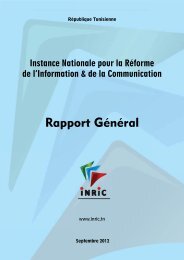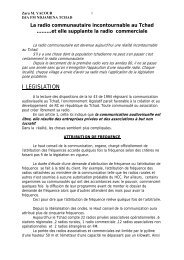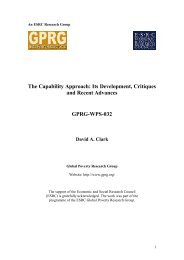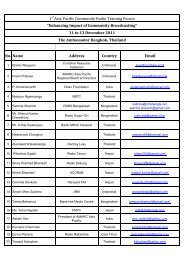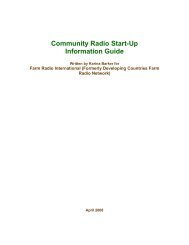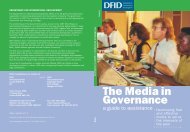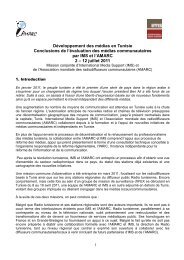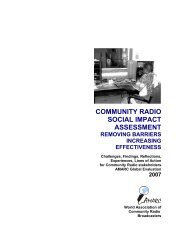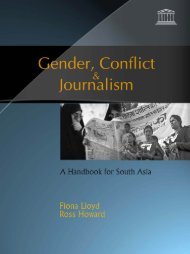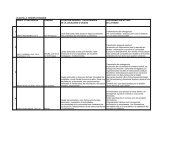WHAT IS COMMUNITY RADIO - amarc
WHAT IS COMMUNITY RADIO - amarc
WHAT IS COMMUNITY RADIO - amarc
Create successful ePaper yourself
Turn your PDF publications into a flip-book with our unique Google optimized e-Paper software.
Chapter 4 Problems you should expect to encounter<br />
Setting up a Community Radio is not without problems. Given the complex nature of social and<br />
economic dynamics at the community level, the different stages of development of each community,<br />
with different cultures, problems are bound to be encountered.<br />
Below is a list of expected problems that can get people thinking on developing strategies to confront<br />
them and resolve them, or even to avoid them.<br />
Difficulties to expect range from:<br />
� Finding ways to encourage, ensure and sustain participation. For community members to actively<br />
participate they need to be convinced that this is for their own benefit. Sometimes they make<br />
supporting statements but leave the process to a few hands and later on - when those few hands do<br />
not address the community needs - communities rebel. This might have a bad effect on whether<br />
you will get your license renewed at your next license application once your license lapses.<br />
Remember, you cannot stop communities from demanding good service and interfering in the<br />
station’s affairs, as they are the owners of the station! A good example of this is the case of Radio<br />
Islam, a community radio that was owned and controlled by a specific Muslim grouping in South<br />
Africa. When this station decided that women could not speak on their airwaves, women and men<br />
from the broader Muslim community rebelled and asked the regulating body that women’s voices<br />
be heard on the station or it be shut down. They based their argument on constitutional rights<br />
granted to women. The station refused to budge and it lost its license.<br />
� Maintaining volunteer involvement. Most stations depend on volunteers. These volunteers tend to<br />
be people without jobs. Whilst this has its positive it also has its negative effects. The positive side<br />
is obvious: they acquire skills and will therefore increase their chances to get a job elsewhere<br />
based on the skills gained at the station. The difficult side is that volunteers often need money for<br />
food, travel to the station and after sometime, they may request money for the time they spend in<br />
the station instead of going elsewhere for a job that pays. A station, even one that is doing well<br />
financially, cannot afford paying a living wage to every volunteer or activist. Volunteer job<br />
descriptions and contracts might help contain the amount of time spent by a few volunteers in the<br />
station, and force the station to involve more volunteers. However, in a context where most people<br />
are working, you will not find this problem. Volunteers in this situation come to the station only<br />
during their spare time and therefore do their station’s work as a service to the community.<br />
� Balancing skill development with the risk of distancing those without skills, who need and demand<br />
to participate. Training does help here but also has its own challenges. For example how do you<br />
choose who will benefit from training, how do you ensure that those chosen feed back to the<br />
station or the community and do not leave to greener pastures once trained (it’s very common),<br />
etc. Many community radio stations experience problems with staff turnover. In some cases a few<br />
people are being trained and then hold on their positions for too long, thereby excluding turnover<br />
and wider community participation. In other cases these few people are offered jobs elsewhere as<br />
soon as they are trained and it creates difficulties with unexpected turnover. In either case, stations<br />
have not planned for continuing training activities directed at many different community members.<br />
� Developing adequate policy, in particular for management, will clearly define the roles of the<br />
different structures and their relations to each other. E.g. the role of the Board of<br />
Trustees/Directors’ versus that of the Management Committee. A good management policy is<br />
necessary for the station to be healthy. Another South African community radio lost its license<br />
because it did not have a proper management structure as a non-profit organisation (AGM, elected<br />
Board, etc.) and was virtually run by a few individuals as if it were their private property. These<br />
individuals were subsequently told to go and open up their own commercial radio station.<br />
� Balancing your fund-raising activities/money-making activities with your mission. E.g. can you<br />
take smoking or alcohol advertising, if your mission explicitly includes the promotion of the<br />
community’s health and well being? Also when you have made enough money, how do you<br />
ensure that such growth do not corrupt you into becoming just like a commercial station. You<br />
32<br />
What is Community Radio? A Resource Guide<br />
Published by AMARC Africa and Panos Southern Africa in collaboration with IB<strong>IS</strong>/Interfund and WACC



